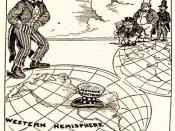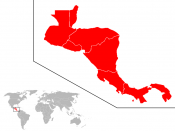The historical objectives of the United States towards the Central American nations have centered on the regionÃÂs importance due to geographic, strategic, and economic reasons. The close proximity of the region to the U.S. has made it an essential area for trading and other commercial interests. Foreign investors, most of whom have been North Americans, have also exploited the land and other resources of the Central American nations, which have forced most of the small nations to depend on unstable single crop economies (LaFeber, p. 61). Professor Walter LaFeberÃÂs first chapter in his book Inevitable Revolutions, details the major actions taken by the United States in setting up relations with its smaller neighboring nations. According to LaFeber, the system, which Washington set up through the policies and actions taken towards the nations of Central America, resulted in the dependence of these nations on the larger nation and the deterioration and overall ÃÂmisshapingÃÂ of Central America (LaFeber, p.
25). An examination of these key historical steps taken by the U.S. since the beginning of its relations with Central America, which set up the system described by LaFeber, reveals the extent to which the United States has continuously overlooked the needs of the neighboring nations in efforts of maintaining its own economic and political prosperity, which inevitably led to the dependence of these nations on the U.S..
Throughout its history in its dealings with the Central American nations the United States has continuously reversed its stance towards policies dealing with the smaller nations in accordance to its best interests under the specific circumstances of the times. LaFeber pinpointed one of the first instances of this contradictory dealing in his description of Thomas JeffersonÃÂs realization that although revolution had once served the interests of the U.S., the principle of revolution in Central...



Term Paper for Latin American History Class
This paper is very long because it was the first paper I wrote as an undergrad student. It basically says that the United States only intervenes with the Latin American countries when it benefits us and in order to maintain its super power over the Western Hemisphere. This can be seen throughout the history of interactions between the United States and the Latin American Countries (Clayton-Bulwer Treaty, Roosevelt Corollary to the Monroe Doctrine). Hope this essay provides a good starting point and is as helpful as possible!
0 out of 0 people found this comment useful.